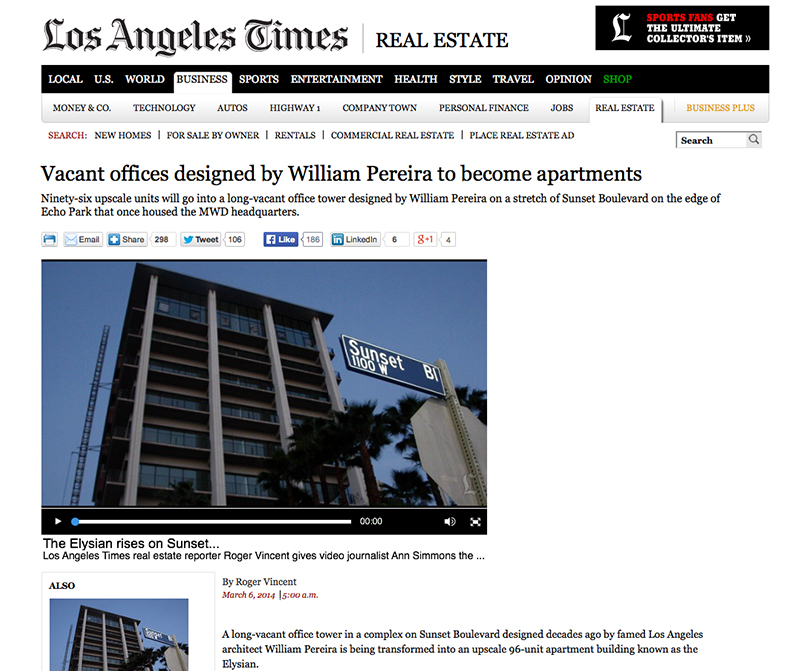Vacant offices designed by William Pereira to become apartments
Ninety-six upscale units will go into a long-vacant office tower designed by William Pereira on a stretch of Sunset Boulevard on the edge of Echo Park that once housed the MWD headquarters.
By Roger Vincent
March 6, 2014, 5:00 a.m.
A long-vacant office tower in a complex on Sunset Boulevard designed decades ago by famed Los Angeles architect William Pereira is being transformed into an upscale 96-unit apartment building known as the Elysian.
The sparsely occupied stretch of Sunset on the eastern edge of Echo Park was perhaps best known as the office headquarters of the Metropolitan Water District, which provides drinking water to six southern California counties, until it moved downtown in 1994.
The tower has been vacant since the MWD moved, said Leonard Hill, a partner at Linear City Development. A previous owner’s plan to convert the building at 1115 Sunset Blvd. to condominiums failed during the recent economic downturn, he said.
Linear City, which has redeveloped historic buildings downtown including a former Nabisco cookie factory, bought the Sunset Boulevard tower in 2011. It plans to open the Elysian by the end of the month.
Pereira was known for his designs of such landmarks as the Transamerica Pyramid office skyscraper in San Francisco and the futuristic restaurant building in the core of Los Angeles International Airport. He also designed CBS Television City in the Fairfax district, the Los Angeles Zoo and the UC Irvine campus.
“This is one of Los Angeles’ most architecturally important buildings from the era and one of Pereira’s few contributions to the downtown L.A. area,” said architect David Lawrence Gray, who planned the Elysian’s transformation. “It’s been gratifying to help bring it back to life after such a long, unfortunate dormancy.”
Gray’s plan for the MWD tower preserved Pereira’s exposed columns, which stretch the full height of the tower, and added balconies to every unit.
He also added a new floor that houses 14 high-ceiling penthouses that will rent for as much as $6,500 a month, Hill said. Smaller units will start at $1,400. Parking will cost an additional $100 or more, but the developers will offer residents an electric vehicle-sharing program.
“By making parking optional to the lease, we’re broadcasting to residents that it might not make sense to even own a car,” said Yuval Bar-Zemer, Hill’s Linear City partner. “We hope to change the way people think about urban living.”
The Elysian, which cost about $30 million to complete, will have an expansive outdoor community garden. That space will have extensive planting, a large fire pit, barbecue area, pergolas and fountains, the developers said.
The remainder of the former MWD site is owned by the Holy Hill Community Church.
The developers of the Elysian hope it will help spur growth on a stretch of Sunset “that has fallen into dormancy if not dereliction,” Hill said.
Already in the pipeline is a large-scale apartment and retail complex called Sunset Gateway proposed by Canadian developer Aragon Properties that would rise on Sunset Boulevard west of the Elysian.
The developments are on the eastern edge of Echo Park in a hilly neighborhood called Victor Heights. It backs up to Elysian Park, the city’s second-largest public park and home to Dodger Stadium.
“We hope this will bring some focus back to Elysian Park,” Hill said. “It’s a gem in need of a good polish. Sunset Boulevard can be re-imagined and re-purposed. Hopefully the Elysian will be a catalyst for the entire neighborhood.”
Victor Heights is named after Victor Beaudry, a water mogul who was the younger brother of Prudent Beaudry, the 13th mayor of Los Angeles.
In the 19th century, the oval-shaped parcel where the former MWD headquarters lies was Beaudry Park and later Sisters Hospital, Los Angeles historian Greg Fischer said.
The Catholic hospital later became known as St. Vincent’s Hospital and moved to 3rd and Alvarado streets. The MWD assembled its parcel in the 1960s, Fischer said.
Victor Heights “is a community that seems to be at a turning point in terms of preserving its unique, authentic character despite increased development pressures,” said Adrian Scott Fine, director of advocacy for the Los Angeles Conservancy.
Linear City has been part of the recent gentrification of the Arts District of Los Angeles. The company converted two old buildings on Industrial Street to the Toy Factory and Biscuit Company Lofts condominiums. Both buildings house restaurants.
It turned four old industrial buildings near the L.A. River into 7+Bridge, a residential loft complex that is also home to Bestia restaurant.

